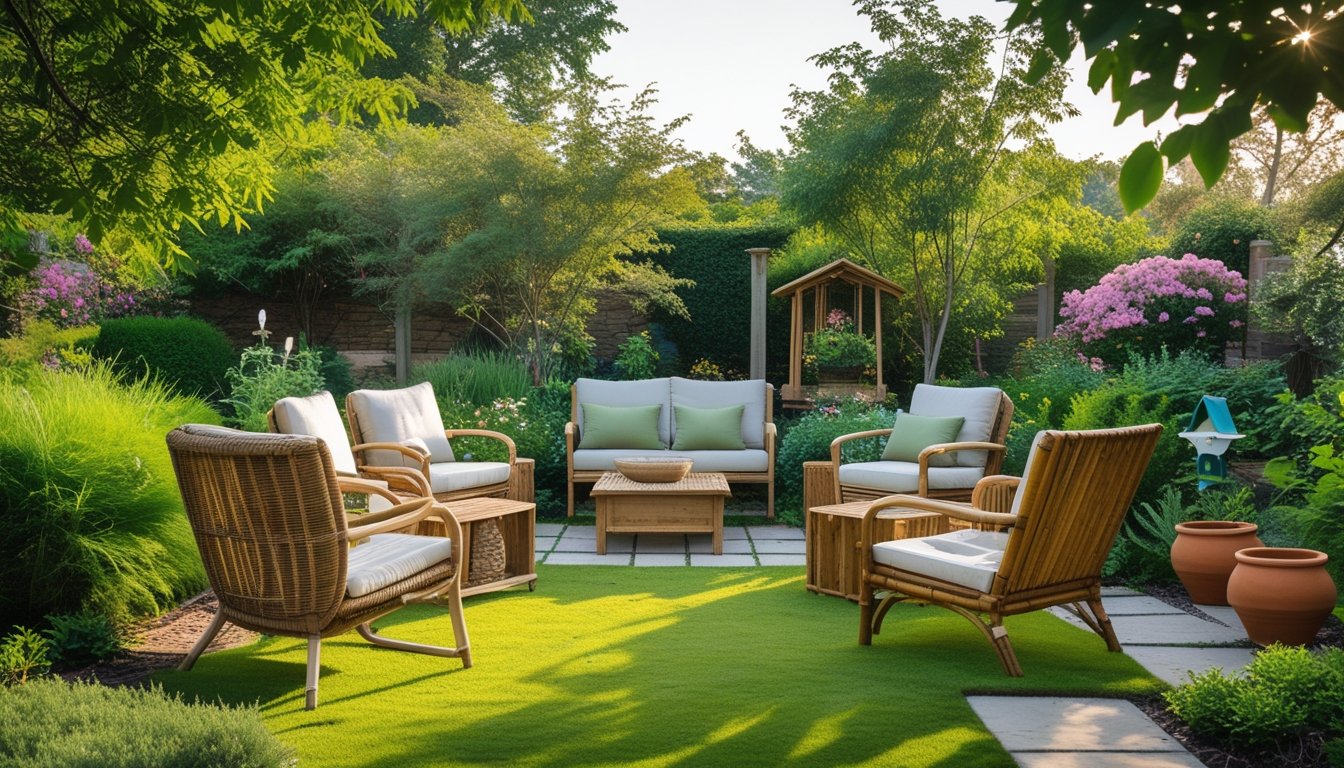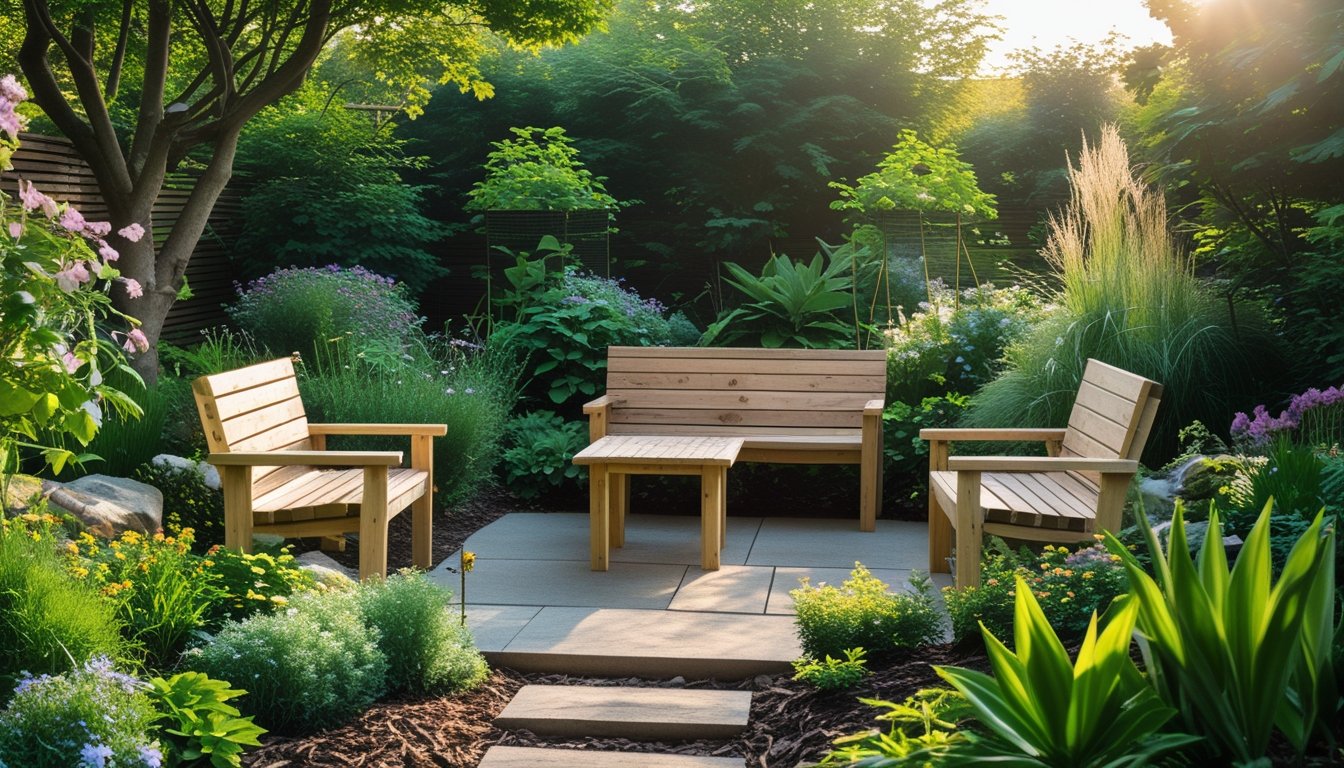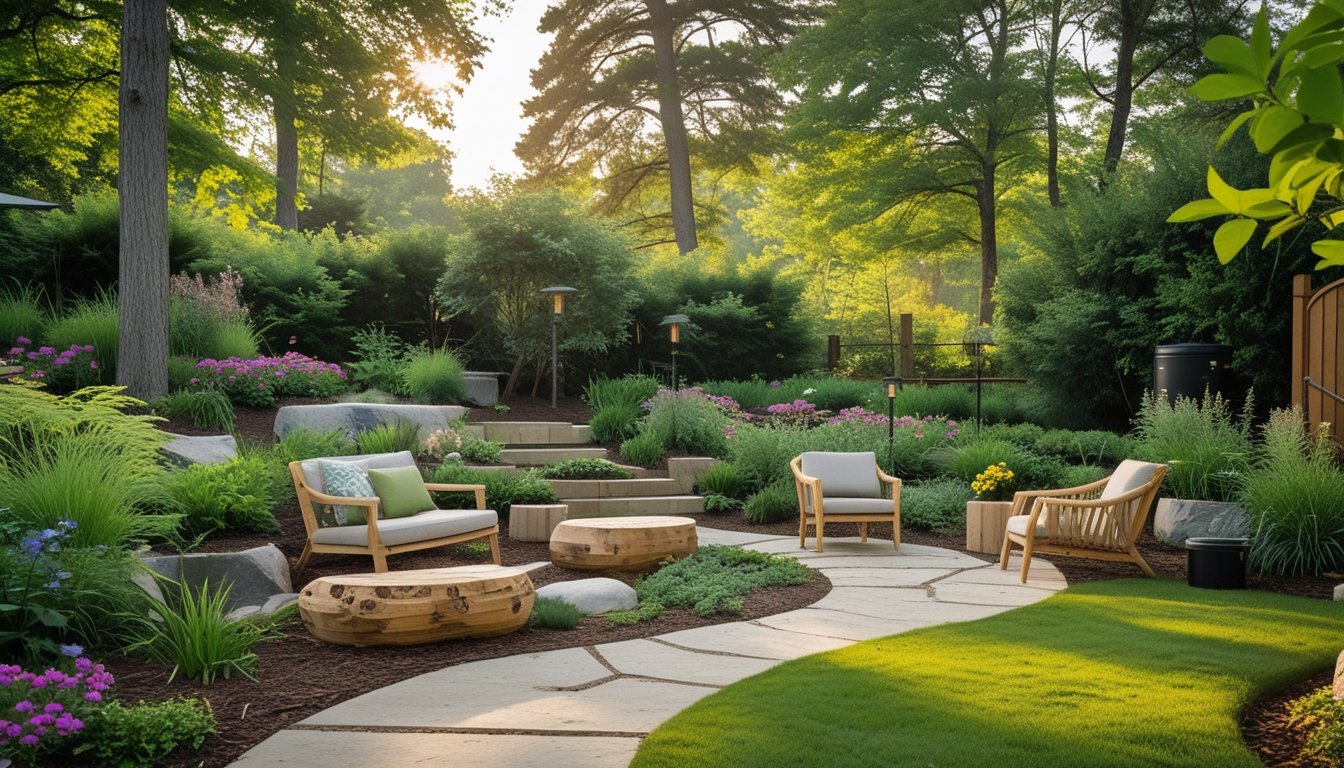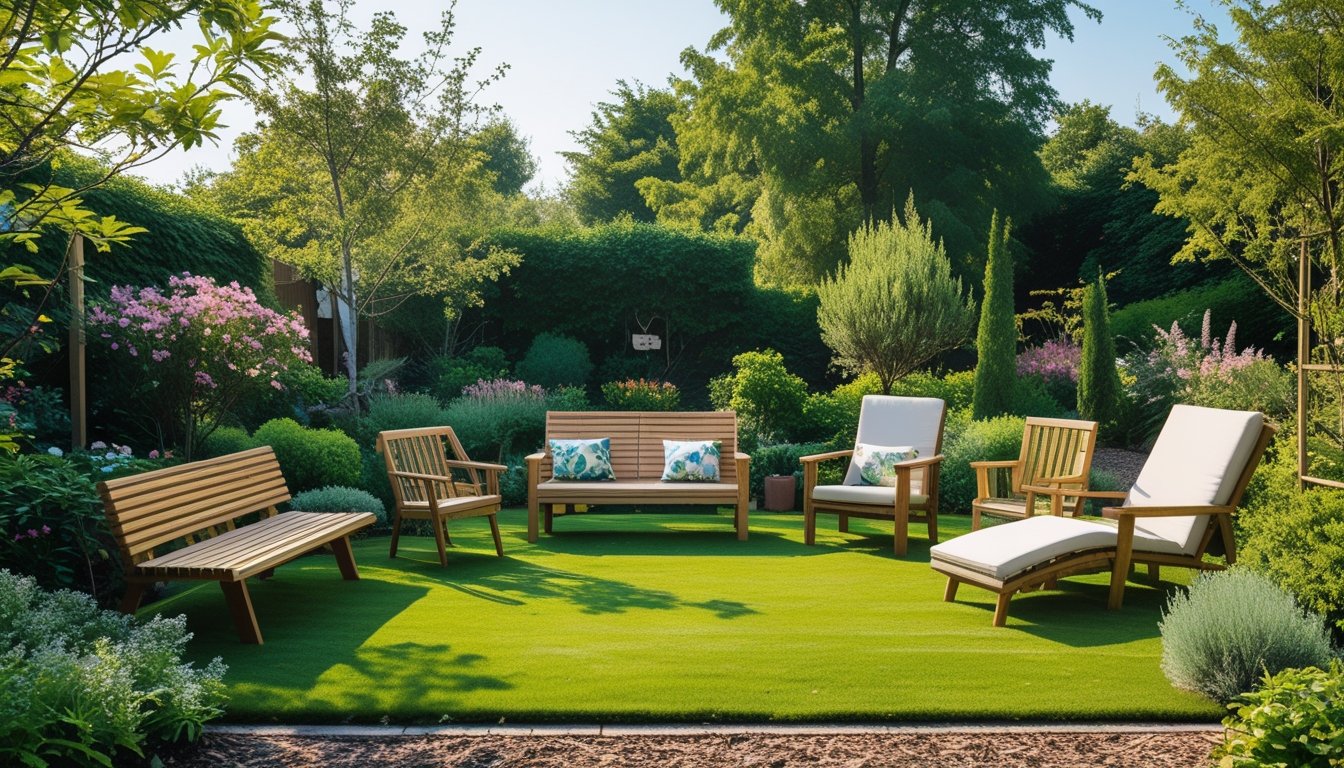Late updated: 06 Oct 2025 11:10
Written by: James Whitaker
Garden Serenity With Eco-Friendly Seating Choices: Transform Your Outdoor Space
Transforming our gardens into serene sanctuaries doesn't just enhance their beauty but can also promote environmental well-being. By choosing eco-friendly seating options like repurposed wine barrels, upcycled pallets, or benches crafted from sustainable materials, we make strides in sustainability while creating inviting spaces. Crafting seating out of recycled materials isn't just a nod to sustainability; it's an effective conversation starter that adds character to our outdoor space.

Beyond aesthetics, eco-friendly choices in the garden offer practical benefits such as reduced maintenance and increased durability. Sustainable seating options, like those made from recycled or renewable resources, often require less upkeep and withstand various weather conditions better than traditional options. This thoughtful approach not only respects nature but also ensures that our gardens remain peaceful retreats for years to come.
There are countless ways to integrate these principles into our garden designs, and by doing so, we support local ecosystems and foster biodiversity. By arranging seating in strategic positions, perhaps around a central plant feature or fire pit, we enhance the garden's aesthetic charm and promote a sense of community and relaxation.
Key Takeaways
- Eco-friendly seating enhances garden serenity and sustainability.
- Recycled and sustainable materials offer durability and character.
- Strategic seating arrangements boost aesthetic and community appeal.
Essential Principles of Eco-Friendly Garden Seating

In creating serene garden seating, both aesthetics and sustainability are paramount. We aim to establish a tranquil yet environmentally harmonious atmosphere. Using eco-friendly materials ensures durability and reduces environmental impact, while thoughtful design considerations cater to the garden's unique needs.
Defining Serenity in the Garden Context
Serenity in a garden revolves around creating a sense of peace and balance. This involves integrating seating that complements the natural environment, using materials and designs that assimilate with surrounding flora. An inviting seating area should encourage mindfulness and relaxation, offering a haven from the daily grind.
Seating layouts should promote conversation or solitude, depending on the preference, using strategic placement amidst natural elements like trees and water features. Simple, minimalist designs often work best, avoiding clutter, and enhancing the connection with nature.
Benefits of Sustainable Seating Materials
Utilising sustainable materials not only benefits the environment but also enhances the garden's aesthetic value. Recycled plastics, reclaimed wood, and sustainably sourced natural fibres like rattan stand out as excellent choices. These materials often require less energy for production and tend to have a longer lifespan compared to more conventional options.
Incorporating such materials supports eco-friendly practices and often involves less maintenance, contributing to a long-lasting outdoor setup. Reclaimed wood provides a rustic charm, while recycled plastics offer weather resistance. Teak and other sustainably sourced woods deliver strength and elegance, ensuring both function and beauty in garden seating solutions.
Key Considerations for Outdoor Durability
Focusing on durability is critical, given the challenging conditions outdoor furniture faces. Consider aspects such as material resilience to weather, particularly moisture and UV exposure. Weather-resistant coatings and waterproof finishes are essential for maintaining the lifespan of garden seating.
Additionally, it's vital to select designs that allow for easy maintenance. Furniture should be easy to clean and resistant to mould and mildew. We should also think about portability; lightweight designs facilitate rearrangement to optimise seasonal changes or to protect during adverse weather, ensuring the seating area remains a serene and welcoming space throughout the year.
Designing a Serene Garden Retreat with Sustainable Choices

Creating a serene garden retreat with sustainable choices involves finding balance between comfort, durability, and eco-friendliness. We must carefully select materials and accessories that enhance relaxation while respecting the environment.
Integrating Seating into Tranquil Garden Spaces
To achieve a peaceful garden setting, seating needs to blend seamlessly with nature. We recommend placing seating areas where the natural elements such as trees or water features enhance solitude and tranquillity. Utilise natural materials like reclaimed wood or recycled metals for benches to lessen environmental impact. Modular seating options provide flexibility, allowing us to rearrange configurations easily. Incorporating soft cushions and durable outdoor rugs can add comfort while complementing the garden's lush greenery.
Selecting Weather-Resistant and Durable Furniture
Choosing furniture that endures various weather conditions is crucial. Materials such as teak, cedar, and recycled high-density polyethylene (HDPE) resist weathering and decay while providing aesthetic appeal. Teak and cedar naturally resist pests and moisture, making them ideal for outdoor use. When selecting HDPE, we ensure it's certified recycled to confirm it’s an eco-friendly choice. Maintenance involves regular cleaning with mild soap and water, keeping our furniture in pristine condition without harming the environment.
Enhancing Serenity with Accessories and Lighting
Accessories like cushions and decorative pillows enhance comfort and add personal touches to our garden retreat. They bring in colour and texture while being easily replaceable or washable. Opt for solar-powered lights to illuminate pathways and seating areas sustainably. Low-energy LED options reduce electricity use. Incorporate organisational elements, such as storage solutions for blankets and decor, maintaining a tidy space. A thoughtful approach to lighting and accessories enhances ambience, inviting relaxation and mindfulness into the garden.
Frequently Asked Questions

In exploring eco-conscious choices for garden seating, we discover options that ensure sustainability while offering style and functionality. Key aspects include selecting durable materials, seasonal maintenance tips, and understanding the longevity of eco-friendly options.
What are the best sustainable materials for garden furniture?
We find materials like teak, recycled plastics, and aluminium are among the top choices for sustainable garden furniture. Each of these materials offers durability and weather resistance, with teak providing a classic wooden appearance and recycled plastics contributing to waste reduction.
How can one maintain eco-friendly garden seating throughout the seasons?
Eco-friendly garden seating requires proper maintenance to withstand seasonal changes. Simple practices such as regular cleaning with mild soap, covering furniture during adverse weather, and storing cushions indoors can greatly extend the lifespan of your outdoor seating arrangements.
Could you suggest some environmentally responsible brands for outdoor seating?
Several brands focus on sustainable practices. Names like Eco Outdoor and Gloster create garden furniture using responsibly sourced materials. Such brands ensure that their production processes minimise environmental impact while maintaining high-quality craftsmanship.
What are the benefits of choosing eco-friendly seating for my garden space?
Choosing eco-friendly seating supports environmental sustainability and often results in savings on maintenance costs. These materials are typically designed to endure various weather conditions, extending their lifespan. Furthermore, they offer an aesthetic that complements a natural garden setting.
How does recycled garden furniture compare in durability to traditional options?
Recycled garden furniture frequently rivals and sometimes surpasses traditional options in durability. Innovations in materials, like high-density polyethylene made from recycled plastics, ensure that these pieces are resistant to weather and everyday wear.
What considerations should be taken into account when selecting eco-friendly cushions and textiles for garden chairs?
We should prioritise textiles made from organic or recycled fibres. Additionally, looking for fabrics treated to be UV and water-resistant can further enhance longevity. Ensuring these cushions are easily washable and replaceable will maintain their appearance over time.
